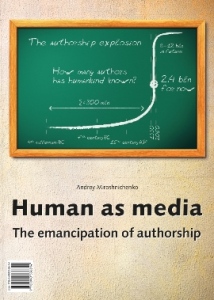The price humankind will pay for the successes of computer technology will turn out to be high.
ICT will lead to a change in basic media: print platforms will be replaced by digital.
The media change will call for a change in the basic principles of content production. The broadcast principle will be crowded out by the interactive, participatory principle. Media has gone from something informing you to something that you do.
Subsequently, the institutions, which previously had a monopoly over broadcast, will be compromised. Moreover, the very principle of institutionalism, upon which human social organization was based throughout the entire history of civilization, will come into doubt. The institutional principle – developed in an era of scarcity, when institutions were necessary for the allocation of resources – will be crowded out by the interactive principle of web cooperation, where people donate their own brainpower, passion and time to communal tasks. This happens when people have a network, on the one hand, and abundance instead of scarcity, on the other.
Along with this, the old principles of the establishment of authority and hierarchy, which were based on material property, will disappear. New principles for the establishment of authority will be based on content production. The new sort of institutionalization, internal to the web, will be based on the possession and development of big data.
The old institutions are engaged in political and cultural conflict with the new digital environment. The outcome is a foregone conclusion.
The replacement of broadcasting with engagement – the death knell of the old broadcast world – is strengthened by a change in the cultural code itself: the language of civilization. In the written and print era, human culture was based on long texts. A thick book was a metaphor for intellect. Today, a mosaic of sources, the phenomenon of multimedia and the ease of surfing via hyperlinks together mean that the length of linear reading (and the attention span in general) is getting shorter. The shortening of the linear reading span results in the decline of reading in general, and, more precisely, the decline of the role that reading and text have played for the last 6,000 years of civilization.
The multimedia language, consisting of short, eye-catching flashes of meaning, will replace lengthy reading. The “fast’n’fun” principle is becoming the new cultural code, which no longer depends on a concrete means of material expression, be it through words, pictures, videos, sounds or something else (or, rather, all these tools together). Huge (and yet unknown) volumes of knowledge, previously gathered in texts for lengthy reading, will be irrelevant; they will not be translated into the new code and will remain in the past. In a little while, long-form reading can turn into something similar to Latin, a dead language of the great antic culture accessible to few.
This cultural transition, in and of itself, even if we disregard political and social changes, is capable of destroying and will destroy the old civilization.
The change in the semantic code of civilization will occur in unison with the global change from the broadcast media model to the involvement media model, and with the replacement of the institutional principle of social structure with the network principle.
Extracted from: Human as media. The emancipation of authorship – by Andrey Miroshnichenko
Available now on Amazon
Categories: Decline of newspapers, Emancipation of Authorship, Human as media book, Media ecology

Reblogged this on Virtual World Television and commented:
Engagement, such as being created through virtual world television.